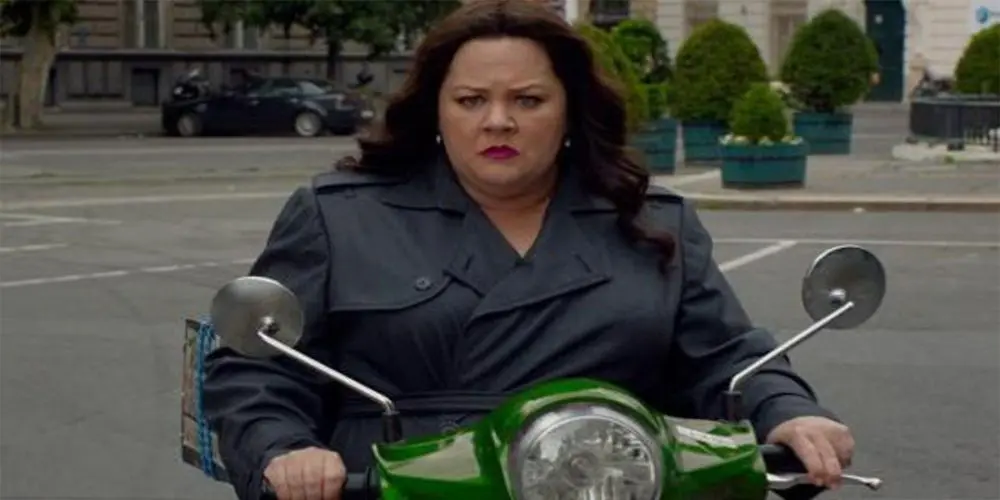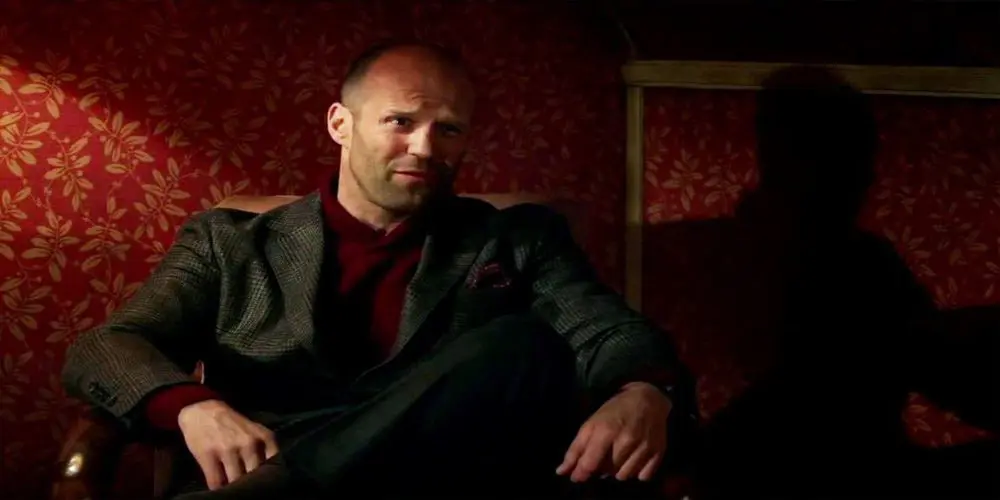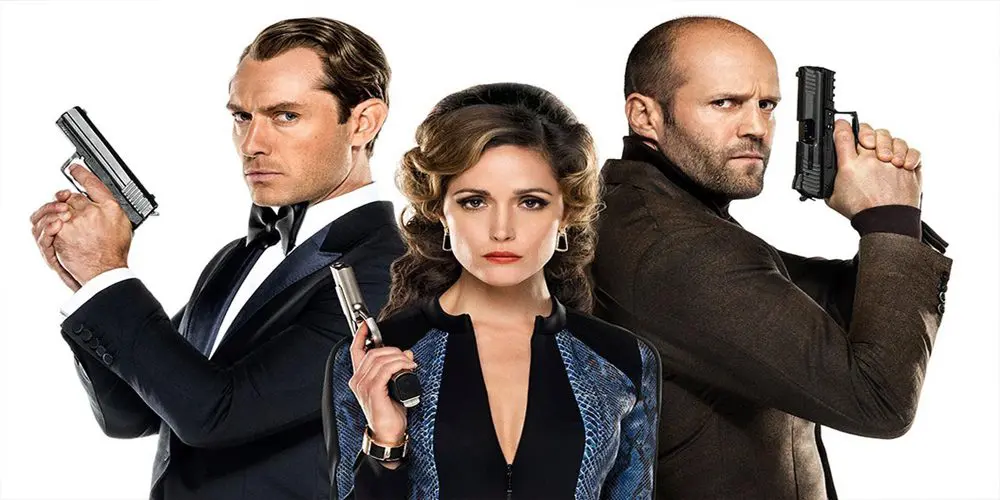Paul Feig – bespectacled, rumpled, perpetually-tailored, like a harangued insurance salesman – doesn’t look like an especially funny guy. He must be, though, to keep writing and directing such funny movies. And really, Paul Feig just might be the most generous director working in comedies today. He evidently sees something in actors which most of us don’t: an innate funniness, even where you’d least expect it. That’s how he assembles such eyebrow-raising ensembles and has them work so well with and against each other. But he doesn’t just allow people to be funny – he encourages it. He writes them into sensible environments which house their eccentricities. He lets them play. Feig’s movies have scenes which you know weren’t written, but instead plucked from a bunch of improvised takes solely because they were the funniest. His latest offering, Spy, feels as though it was built almost entirely on scenes like that. It’s hilarious in the loosest, most playful way possible, like the whole cast were working behind the camera and taking their time off in front of it.
Although ostensibly an espionage-movie spoof, a large part of the reason why Spy works so well is that a lot of it is played unironically. The setting kicks the CIA through Savile Row. The plot has Jude Law (as a studly secret super-agent named Bradley Fine) trip over his American accent into a nuclear conspiracy. It’s all taken fairly seriously. But Feig delights in presenting genre tropes earnestly just so he can subvert or laugh at them later. Fine tosses around a group of thugs in slow-motion; he doesn’t get hit, doesn’t muss his hair, doesn’t crease his tuxedo. But when he has his target at gunpoint, he sneezes a bullet loose and accidentally shoots him in the head. See, he forgot his antihistamines. His allergies have been terrible the whole trip.

All the while, Melissa McCarthy’s put-upon, office-bound analyst, Susan Cooper, chirps in Bradley’s earpiece and peers through the camera in his contact lens, warning him of approaching assassins thanks to a classically impossible surveillance system. At least twice, vermin infest the underground bunker in which she works. There’s no reason for this to happen other than to laugh at the various reactions to it, one of which is Jessica Chaffin deadpanning, “There’s a mouse on my tits”. But Susan is less concerned with bats in her hair and rats on her keyboard than she is with the safety of Bradley, for whom she’s nursing an obsessive crush to which he’s utterly oblivious – often to the point of borderline cruelty. In a change of pace for a McCarthy vehicle, she knows how pathetic that is, but it doesn’t stop her swearing vengeance when Bradley is offed on the job by a femme fatale crime heiress (Rose Byrne).
Feig seems to understand McCarthy’s appeal as an atypical female screen comic who specialises in broad physical comedy and vulgar excesses. Spy is the third movie they’ve made together, and if it were up to me she’d never work with anyone else. Watching her in execrable garbage like Identity Thief is sad, because you know the movie is laughing at her. Even the abominable Tammy, which she co-wrote and her husband, Ben Falcone, directed, cast her in a pathetic part which buried her under jokes at her own expense. Feig doesn’t see McCarthy that way. In Bridesmaids, their first collaboration, he gave her a supporting role which propelled her into stardom. In The Heat he gave her the perfect foil in Sandra Bullock. The movie was underwhelming, but it was never out to humiliate anyone. Here, in Spy, he’s given her a complete character; more to the point, one which pulls double-duty as a metaphor for McCarthy overcoming her typecasting.
Agent Fine’s death also results in all the CIA’s active field agents having their covers blown, leaving the agency’s director (Allison Janney) no choice but to reluctantly stick Susan, pinkeye and all, on the trail of the missing nuke. The conceit here is that she’s actually perfectly suited to the job: by all accounts she should be a field agent already, but her self-esteem issues (and, it’s implied, some manipulation on the part of Fine) compelled her to settle for a position as an analyst. The CIA keeps giving her insulting gadgets and stereotypical “fat lady” cover identities. It’s an on-the-nose swipe at the kinds of unglamorous roles McCarthy’s likely offered a lot, but it’s a funny one. Feig uses it to lend her an exasperated, obnoxious heroism. You get the sense nobody else could pull this role off, which is the point. But the movie isn’t unfairly rigged in her favour, and most of the fun is in watching how ably McCarthy wrestles the movie away from all the supporting actors who keep trying to steal it.

One of them is a perfectly-cast Jason Statham, playing the best riff on his usual macho badass character you’re likely to see anywhere in the movies. His increasingly bizarre recollections of previous battlefield exploits (“This arm has been ripped off completely… and reattached with this fucking arm”) are among the film’s funniest moments. He’s done comedy of a sort before, largely as the straightman in Guy Ritchie’s British gangster movies, but he’s playing a caricature here. Everyone is. Feig evidently likes to bounce one elaborate personality off another, so the characters all communicate in put-downs and gags. The best are swapped between McCarthy and Byrne, whose character, Rayna, a London-educated Bulgarian, cautiously brings Susan into her snooty inner-circle. It works best in a third-act digression where Susan abandons her agency-approved cover and glams up for a Bond-parody interlude. Rayna spews Mean Girls venom all over her efforts. Later, when Rayna is pushed to the ground in a lightless fight scene, Susan quips with mock-sincerity, “Thank god your hair broke your fall”.
The near-constant sniping and parrying is what sustains Spy for its slightly overlong running time. This is a story which probably didn’t need two hours to be told. It’s breathless by the time it reaches the finish line. But, so are the audience. The jokes never stop landing. There’s a lot to be said for a comedy which isn’t just consistently funny, but constantly funny. And the advantage of having such great writing and so much talent all on one project is that you never know where the next bit is coming from. Watching Spy is like a reflex test. You come out of it gleefully on edge, sides aching, ready for more of the same.




